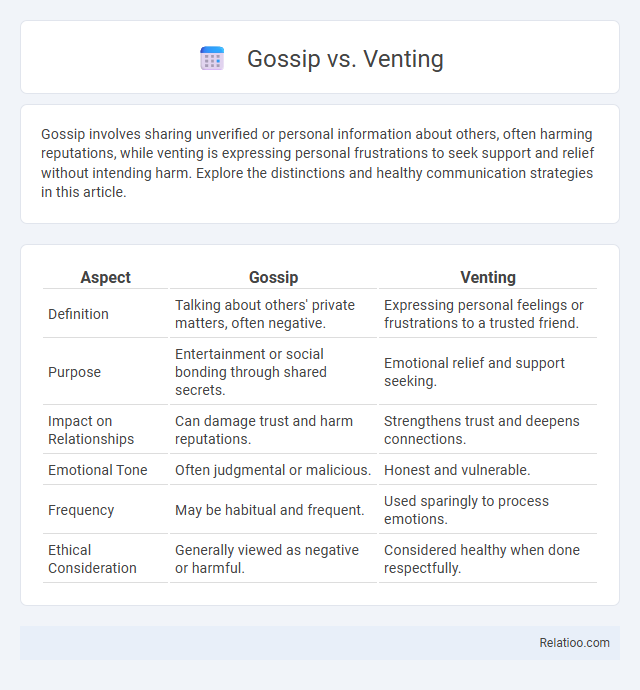Gossip involves sharing unverified or personal information about others, often harming reputations, while venting is expressing personal frustrations to seek support and relief without intending harm. Explore the distinctions and healthy communication strategies in this article.
Table of Comparison
| Aspect | Gossip | Venting |
|---|---|---|
| Definition | Talking about others' private matters, often negative. | Expressing personal feelings or frustrations to a trusted friend. |
| Purpose | Entertainment or social bonding through shared secrets. | Emotional relief and support seeking. |
| Impact on Relationships | Can damage trust and harm reputations. | Strengthens trust and deepens connections. |
| Emotional Tone | Often judgmental or malicious. | Honest and vulnerable. |
| Frequency | May be habitual and frequent. | Used sparingly to process emotions. |
| Ethical Consideration | Generally viewed as negative or harmful. | Considered healthy when done respectfully. |
Understanding Gossip and Venting: Key Definitions
Gossip involves sharing personal or sensational information about others, often without their consent, which can damage reputations and trust. Venting is the healthy expression of emotions and frustrations to release stress, focusing on your feelings rather than others' behaviors. Understanding these distinctions helps you communicate more effectively and maintain positive relationships.
The Psychological Roots of Gossip and Venting
Gossip and venting both serve psychological functions rooted in social bonding and emotional regulation. Gossip often stems from a desire to establish social hierarchies and share information about group norms, while venting provides an outlet for expressing personal frustrations and seeking empathy. Understanding these differences helps you manage conversations more mindfully, promoting healthier communication patterns.
Core Differences Between Gossip and Venting
Gossip involves sharing information about others that may be unverified or private, often leading to judgment or harm, while venting allows you to express personal frustrations without the intent to harm or share details about others. The core difference lies in intent: venting serves as an emotional release focused on your feelings, whereas gossip revolves around discussing others' actions or lives. Understanding this helps you communicate your frustrations healthily without causing unnecessary conflict.
Social Impacts: Gossip vs Venting in Relationships
Gossip often damages trust and fosters negativity in relationships by spreading unverified information and creating divisions among social groups. Venting, when done constructively, can strengthen bonds by providing emotional release and fostering understanding between individuals. The social impact of gossip tends to erode relationship quality, whereas venting encourages empathy and promotes healthier communication.
Emotional Consequences: How Gossip and Venting Affect Well-Being
Gossip often leads to negative emotional consequences such as increased anxiety, mistrust, and social tension, which can harm your overall well-being. Venting, when done constructively, helps release stress and fosters emotional relief without damaging relationships. Understanding the distinct impacts of gossip and venting can help you maintain healthier social interactions and protect your mental health.
Gossip in the Workplace vs Healthy Venting Practices
Gossip in the workplace often undermines trust and damages team morale, spreading misinformation that can escalate conflicts and lower productivity. Healthy venting practices, on the other hand, involve expressing frustrations constructively with the aim of seeking solutions or emotional relief without harming others' reputations. To maintain a positive work environment, you should focus on open communication and professional boundaries rather than engaging in harmful gossip.
Identifying When Venting Turns Into Gossip
Venting involves expressing genuine feelings or frustrations to seek relief or support, whereas gossip often entails sharing personal information about others with a judgmental or exaggerated tone. Recognizing the shift occurs when the conversation moves from sharing emotions to spreading unverified details or criticizing someone behind their back. Key indicators include a focus on others' private matters without a constructive purpose and a desire to influence opinions rather than resolve personal stress.
Setting Boundaries: Safe Spaces for Venting
Setting boundaries in conversations is crucial to distinguish between gossip and venting, ensuring your emotional expression remains safe and respectful. Safe spaces for venting prioritize confidentiality and empathy, allowing you to release frustration without judgment or harmful rumors. Establishing clear limits on what is shared helps maintain trust and prevents conversations from turning into damaging gossip.
Strategies to Avoid Gossip and Encourage Constructive Venting
Distinguishing gossip from venting is vital for maintaining a healthy communication environment, where gossip involves spreading unverified or harmful information, while venting allows you to express genuine feelings constructively. Strategies to avoid gossip include setting clear boundaries, redirecting conversations toward solutions, and fostering a culture of trust and respect in your social or professional circles. Encouraging constructive venting can be achieved by providing empathetic listening, validating emotions without judgment, and promoting problem-solving discussions that focus on personal growth and resolution.
Building a Positive Culture: Replacing Gossip with Supportive Communication
Replacing gossip with supportive communication fosters a positive workplace culture by encouraging openness and trust among team members. Your focus on venting as a healthy release of emotions, rather than spreading rumors, helps create an environment where concerns are heard without judgment. Promoting direct, empathetic conversations strengthens relationships and reduces the harm caused by gossip.

Infographic: Gossip vs Venting
 relatioo.com
relatioo.com